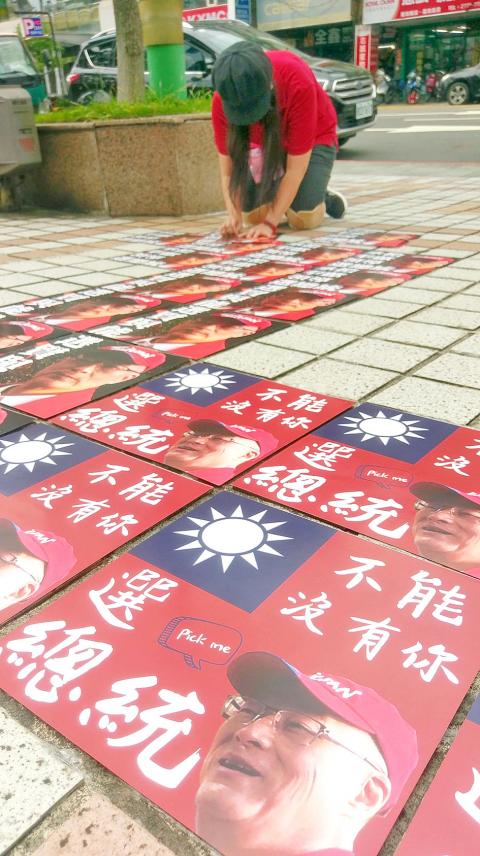The Chinese Nationalist Party’s (KMT) presidential nomination panel yesterday announced a list of five candidates for the party’s presidential primary.
The panel named Kaohsiung Mayor Han Kuo-yu (韓國瑜), Hon Hai Precision Industry Co chairman Terry Gou (郭台銘), former New Taipei City mayor Eric Chu (朱立倫), former Taipei County commissioner Chou Hsi-wei (周錫瑋) and National Taiwan University political science professor Chang Ya-chung (張亞中).
The candidates are to vie for the KMT’s nomination to run in the presidential election in January next year.

Photo: Fang Pin-chao, Taipei Times
They have been invited to attend a meeting at party headquarters today, as well as three platform presentations to be held by the KMT’s National Policy Foundation think tank from late this month to early next month, KMT Vice Chairman Tseng Yung-chuan (曾永權) said at the party’s headquarters in Taipei.
The KMT would conduct landline-based polls from July 5 to 15 to determine the primary’s winner, he said, adding that the poll results would be reviewed by the KMT Central Standing Committee on July 17, before being submitted to a national convention for approval on July 28.
Asked about Gou’s suggestion last week that the KMT devise a backup plan in case the primary’s winner cannot run in the election, Tseng said the party respects Gou’s opinion, but added that the regulations passed by the committee do not require a backup.
At a news conference in Taipei yesterday, Gou again called on the KMT to consider his suggestion and proposed conducting cellphone-based polls.
He would attend today’s meeting, he said, expressing hope that the party would give him and the other candidates a clear answer regarding his suggestions.
Without clear primary regulations to ensure fairness, “what happened with former legislative speaker Wang Jin-pyng (王金平) could happen again,” he said, referring to Wang’s announcement last week that he would forgo the primary.
The KMT has asked the candidates to sign a pledge saying that they will not run for president if they do not win the primary, but Gou said that he has not signed it.
“Why should I sign anything before there are even [clear] primary regulations in place? I urge the other candidates not to sign it either,” he said.
Chu told reporters at an event in New Taipei City that pledging not to run for president unless nominated by the party is a “basic requirement.”
KMT members who are considering running for president, but not as a party member should not join the primary, he added.
Asked at another event in Taipei whether he would attend today’s meeting, Chu said that he would not, citing conflicting travel plans.
Han, when asked in Kaohsiung about Gou’s call not to sign the pledge, said that he respects Gou’s opinions, adding: “I have my own views.”
Asked the same question at a cross-strait forum in Taipei, KMT Chairman Wu Den-yih (吳敦義) said that the candidates do not have to agree to “every word” of the pledge and that its contents can be adjusted.
The candidates can focus on areas they find important, as long as they have “the right spirit” and are in line with the KMT’s principles, he added.

Taiwanese can file complaints with the Tourism Administration to report travel agencies if their activities caused termination of a person’s citizenship, Mainland Affairs Council Minister Chiu Chui-cheng (邱垂正) said yesterday, after a podcaster highlighted a case in which a person’s citizenship was canceled for receiving a single-use Chinese passport to enter Russia. The council is aware of incidents in which people who signed up through Chinese travel agencies for tours of Russia were told they could obtain Russian visas and fast-track border clearance, Chiu told reporters on the sidelines of an event in Taipei. However, the travel agencies actually applied

Japanese footwear brand Onitsuka Tiger today issued a public apology and said it has suspended an employee amid allegations that the staff member discriminated against a Vietnamese customer at its Taipei 101 store. Posting on the social media platform Threads yesterday, a user said that an employee at the store said that “those shoes are very expensive” when her friend, who is a migrant worker from Vietnam, asked for assistance. The employee then ignored her until she asked again, to which she replied: "We don't have a size 37." The post had amassed nearly 26,000 likes and 916 comments as of this

New measures aimed at making Taiwan more attractive to foreign professionals came into effect this month, the National Development Council said yesterday. Among the changes, international students at Taiwanese universities would be able to work in Taiwan without a work permit in the two years after they graduate, explainer materials provided by the council said. In addition, foreign nationals who graduated from one of the world’s top 200 universities within the past five years can also apply for a two-year open work permit. Previously, those graduates would have needed to apply for a work permit using point-based criteria or have a Taiwanese company

The Shilin District Prosecutors’ Office yesterday indicted two Taiwanese and issued a wanted notice for Pete Liu (劉作虎), founder of Shenzhen-based smartphone manufacturer OnePlus Technology Co (萬普拉斯科技), for allegedly contravening the Act Governing Relations Between the People of the Taiwan Area and the Mainland Area (臺灣地區與大陸地區人民關係條例) by poaching 70 engineers in Taiwan. Liu allegedly traveled to Taiwan at the end of 2014 and met with a Taiwanese man surnamed Lin (林) to discuss establishing a mobile software research and development (R&D) team in Taiwan, prosecutors said. Without approval from the government, Lin, following Liu’s instructions, recruited more than 70 software